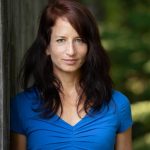 When I look at the story of my chronic pain, it keeps moving— a slippery fish, not a fixed truth. I see how it’s shifted over the years, how it keeps on shifting as I grow older and more grounded in self-understanding. The act of putting my illness into writing in 2018 was cathartic. For years I’d shared my pain struggle only with my closest friends and being open about it felt like a great weight lifted. I articulated the connections I’d made between my past traumas— particularly my sexual assault at age 18—and the inherited trauma from my mother’s brutal near-murder in 1966, and how they manifested in my body as a mysterious pelvic pain condition.
When I look at the story of my chronic pain, it keeps moving— a slippery fish, not a fixed truth. I see how it’s shifted over the years, how it keeps on shifting as I grow older and more grounded in self-understanding. The act of putting my illness into writing in 2018 was cathartic. For years I’d shared my pain struggle only with my closest friends and being open about it felt like a great weight lifted. I articulated the connections I’d made between my past traumas— particularly my sexual assault at age 18—and the inherited trauma from my mother’s brutal near-murder in 1966, and how they manifested in my body as a mysterious pelvic pain condition.
I was diagnosed with Interstitial Cystitis (IC) in 2003 after a year of excruciating symptoms, suicidal depression and being disbelieved by doctors. In addition to IC, I was told I had pelvic floor dysfunction and vulvodynia, a constellation of pelvic conditions that were interrelated but lacked an explicable cause or clear treatment path. In my journey of healing, I worked with a wonderful IC specialist but also saw therapists, bodyworkers and holistic practitioners. I went back and back in time to trace the wounds to my pelvic region, not just my rape in 1992 but other sexual violations, as well as the unnecessary emergency surgery performed by a gynecologist when I was 16. I saw how trauma lives in the body, along with fear and the instinct for self-protection. I understood that the two emergency c-sections I’d had giving birth to my daughters (both traumatic in their own right) were part of the larger story.
Mercifully, my IC has been in remission since I wrote “The Killer Who Spared My Mother” nearly three years ago. Maybe sending that piece out into the world allowed me to drop my mother’s story, stop holding it in my second chakra, braced for future pain. I know the symptoms could return at any point, and I’m not naïve enough to think my pain journey is over. I must take good care of my health—physical, mental and spiritual. I see a wise therapist every week who does embodied counseling, and with her I’m working through the layers of family trauma, setting down the burdens carried by generations of female ancestors.
Now my daughters are teenagers, the same age I was when I first experienced violations of my body. As I watch them struggle with their own traumas, I am determined to be honest and open, to model self-love and resilience, and to see myself as a survivor, not a victim.
Of Special Note: Diana Whitney is the author of You Don’t Have to Be Everything: Poems for Girls Becoming Themselves. Created and compiled just for young women, You Don’t Have to Be Everything is filled with works by a wide range of poets who are honest, unafraid, and skilled at addressing the complex feelings of coming-of-age, from loneliness to joy, longing to solace, attitude to humor. These unintimidating poems offer girls a message of self-acceptance and strength, giving them permission to let go of shame and perfectionism.
